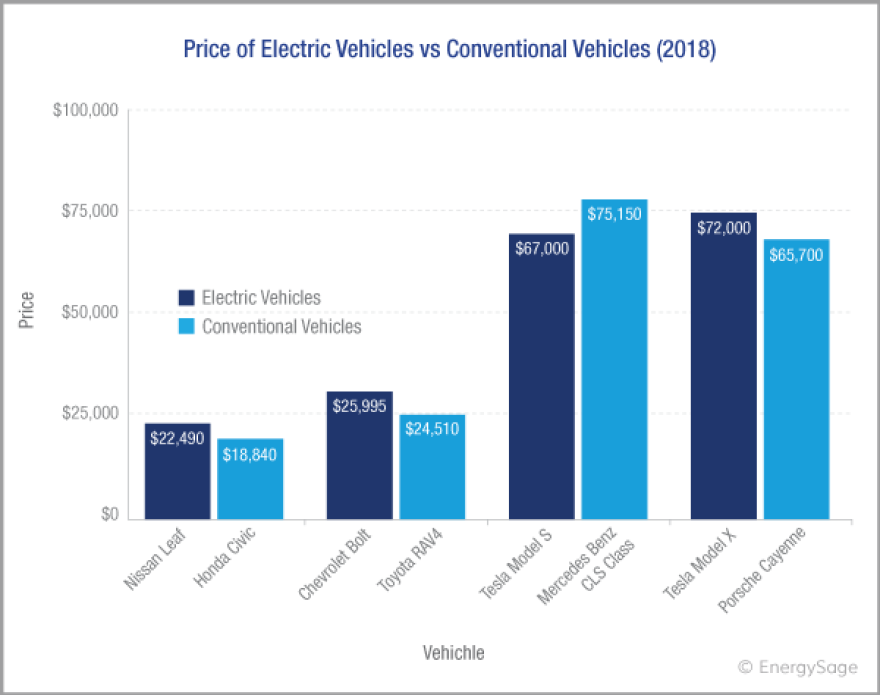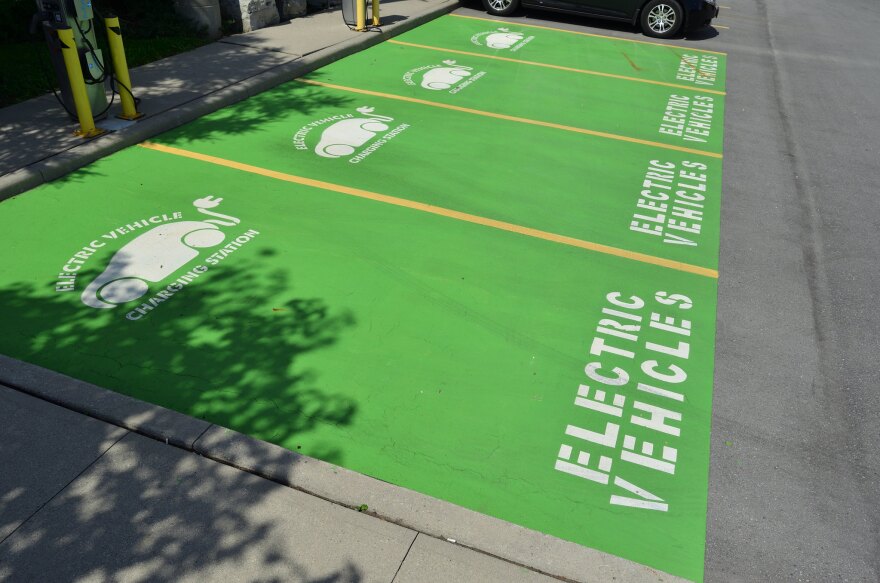More than two dozen bills at the Hawaii Legislature aim to increase the use of electric vehicles, but auto dealers and green energy proponents are supporting different approaches.
Half of all the energy consumed in Hawaii goes for transportation, according to the U.S. Energy Information Administration. Most of that comes from oil-based fuels like gasoline, jet fuel and marine diesel.
In its 2019 Energy Report Card, the Honolulu-based Blue Planet Foundation said cars, airplanes, and boats are responsible for two-thirds of all fossil fuel consumption in Hawaii.
Advocates and elected officials, including Gov. David Ige, have declared their intent to decarbonize Hawaii’s economy. Transportation’s dependence on fossil fuel has spurred local policymakers to explore ways of accelerating the adoption of electric vehicles by consumers and government agencies.
EVs, as they’re known, currently account for fewer than 1% of Hawaii’s 1.3 million registered vehicles. One reason for that is cost.
Although electric vehicles are cheaper to operate and maintain, their sticker price is typically a little higher than an equivalent gas-powered car.
Melissa Miyashiro, managing director with the Blue Planet Foundation, says the group wants to find ways to lower the upfront cost of electric vehicles and make them price-competitive with conventional gas cars.
One proposal Blue Planet is supporting is called a “fee-bate.”
“There would be a fee that’s charged on our most fuel-inefficient vehicles and that would fund rebates for electric vehicle models that are under a certain MSRP,” Miyashiro said in an interview, referring to the manufacturer suggesed retail price.
The Toyota Tacoma pickup truck, which gets 19 miles per gallon, is the most popular vehicle in Hawaii by annual sales.

Miyashiro points out that a major electric vehicle incentive, free parking for EVs at state facilities like airports and county parking meters, is set to expire in July.
Another idea to boost EV sales is to provide a state tax credit for new electric vehicle purchases. A similar program already in place at the federal level, providing a tax credit of up to $7,500 to offset the purchase of an EV.
But that idea has not generated support among local auto dealers.
David Rolf with the Hawaii Auto Dealers Association describes tax credits as “very disruptive” to the industry.
He cites what happened in Georgia, which once had a $5,000 EV tax credit. At one point, Georgia had the second-most electric vehicles on the road of any state.
But when lawmakers later repealed the credit, Rolf says EV sales plummeted.
“When they stopped it, instead of selling 1,400 vehicles per month, they went down to selling 100 vehicles per month,” he said.
Rolf says that under current market conditions, Hawaii is on track to achieve 29% EV penetration by 2045.
Based on current sales data, he estimates it would take a credit of $20,000 dollars per EV, on top of the current $7,500 federal credit, to reach 100% electric vehicle usage by mid-century.
Blue Planet disputed that claim and said they believe the number is much lower. State lawmakers are currently debating a $2,500 tax credit.

Rolf says auto dealers would prefer to see the government fund a public marketing campaign to encourage EV adoption. He argues it will produce better results, at a lower cost to taxpayers.
Some lawmakers want to go beyond financial incentives for EV’s, and target the supply of conventional internal combustion cars. Multiple bills call for a ban on the sale of new gas vehicles altogether.
While that may sound drastic, Melissa Miyashiro says that type of dramatic action may be what is needed.
“As a state, our emissions in the ground transportation sector are increasing so we know that we need to do something dramatic and to address the impacts of climate change,” she said.
Proposed start dates for a ban range from 2025 to 2045. David Rolf says the economic consequences to his industry would be dire.
“You would have interrupted careers and lives of 4,400 people who work in our industry directly at another about 10,000 outskirts of our industry attending helping serve it,” he said in an interview.
In considering a ban on new sales, Rolf says a prohibition starting in 2050 would be more reasonable from the auto industry’s perspective. He said the industry expects rapid growth in EV sales after 2040.
In 2017, all four county mayors in Hawaii committed to achieving 100% renewable-powered transportation by 2045. The state is committed to 100% renewable electricity generation by 2045.



